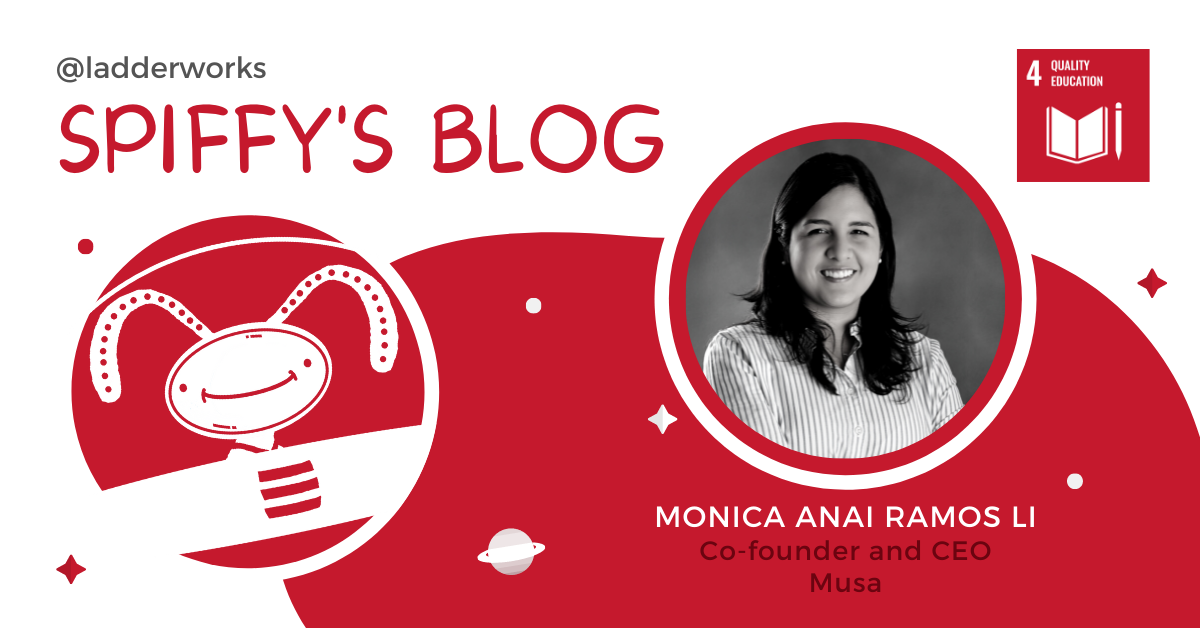Monica Anai Ramos Li: Improving Education Access for Entrepreneurs on the Go

¡Hola, amigos! It’s me, Spiffy, your trusty interplanetary journalist bringing you the latest scoop on the adventures of inspiring entrepreneurs here on Planet Earth. Today, I’m delighted to be speaking with Monica Anai Ramos Li, the CEO and co-founder of Musa. Monica is working to improve access to high-quality education for motivated earthling minds in Peru and beyond. Let’s see how she’s doing it!
Spiffy: Thanks for joining me, Monica! Can you tell me what challenge Musa is addressing?
Monica: I’m happy to chat with you, Spiffy! Musa addresses the pressing need to upskill and reskill the Latin American workforce in an equitable manner, including people with limited access to computers and internet connectivity. We transform an organization’s training content into a micro-learning methodology based on behavioral science, and we facilitate its delivery through a WhatsApp chatbot. Users can access it from anywhere, anytime, and learn at their own pace.
Spiffy: Oh, neat! What motivated you to do it?
Monica: Musa was born in the middle of the COVID-19 pandemic as a solution to reach traditional (primarily informal) entrepreneurs in Peru and deliver relevant content and training to them in an engaging and convenient way in order to help them rapidly adapt their businesses to the "new normal." Our purpose is to democratize access to education that allows people to reach their full potential via tools they already use, such as WhatsApp.
Spiffy: How are you and your team at Musa working towards a more equitable world?
Monica: Our business model is business-to-business (B2B), serving mainly companies and non-governmental organizations (NGOs). Musa helps our clients increase the scope of their training, allowing them to engage stakeholders who may be difficult to reach because of limited access to the internet or computers, or because they are constantly moving.
Spiffy: Tell me about one of Musa’s recent milestones or initiatives. What impact does it make?
Monica: A recent milestone for the Musa team was joining StartUp Chile, a publicly funded acceleration program in Chile. This allowed us to validate the product-market fit within the Chilean market and accelerate our growth beyond Peru.
Spiffy: Super! I also give each entrepreneur I interview a chance to share with our readers stories about your past experiences of failure, how you overcame them, and what you learned. What can you tell us?
Monica: Before Musa, I founded another social enterprise working with small coffee farmers in Peru in 2016 to upcycle their by-products. After almost six years, this company has neither achieved economic sustainability nor created the environmental and social impact I expected. From this experience, I learned several lessons. First, your team is everything—having difficult conversations at the beginning is essential to building a solid founding team. Next, focus and learn about the needs of your target market before drafting a solution. I made the mistake of focusing on creating a product from agricultural waste rather than exploring the target market first. Ultimately, any social enterprise needs to be economically sustainable to scale its impact in the long term.
Spiffy: Is there anything else you would love to tell our young intergalactic audience before we zip off?
Monica: I would invite them to identify something that bothers them in their school, neighborhood, or home and start doing something to change it today. Sometimes we believe that to have a social or environmental impact we need to go big. However, small actions matter. The cumulative effect of many small steps over time can create significant change.
Spiffy: Thanks for speaking with me today, Monica—it’s been an honor!
Monica Anai Ramos Li is the CEO and co-founder of Musa. She is an industrial engineer by training but in practice a social entrepreneur passionate about creating solutions to real problems and empowering people to achieve a better quality of life through education and the development of circular business models. (Nominated by Josef Scarantino at Hubspot Ventures. First published on the Ladderworks website on May 23, 2022.)
© 2022 Ladderworks LLC. Edited by George Romar. Spiffy’s illustration by Shreyas Navare. For the Ladderworks digital curriculum to help K-3 kids advance the UN SDGs, visit Spiffy's Corner here.


